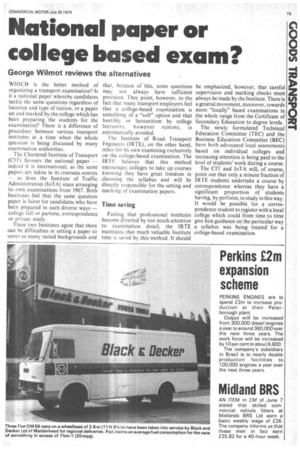National paper or college based exam?
Page 19

If you've noticed an error in this article please click here to report it so we can fix it.
George Wilmot reviews the alternatives
WHICH is the better method of organizing a transport examination? Is it a national paper whereby candidates tackle the same questions regardless of location and type of tuition, or a paper set and marked by the college which has been preparing the students for the examination? There is a difference of procedure between various transport institutes at a time when the whole question is being discussed by many examination authorities.
The Chartered Institute of Transport (C1T) favours the national paper -indeed it is international, as the same papers are taken in its overseas centres ----as does the Institute of Traffic Administration (loTA) since arranging its own examinations from 1967. Both Institutes feel that the same question paper is fairer for candidates who have been prepared in such diverse ways — college lull or partime, correspondence or private study.
These two Institutes agree that there can be difficulties in setting a paper to cover so many varied backgrounds and that, because of this, some questions may not always have sufficient precision. They point, however, to the fact that many transport employers feel that a college-based examination is something of a "soft" option and that hostility or favouritism by college 'lecturers, however remote, is automatically avoided.
'The Institute of Road Transport Engineers (IRTE), on the other hand, relies for its own examining exclusively on the college-based examination. The IRTE believes that this method encourages colleges to take up courses knowing they have great freedom in choosing the syllabus and will be directly responsible for the setting and marking of examination papers.
Time saving
Feeling that professional institutes become diverted by too much attention to examination detail, the IRTE maintains that much valuable Institute time is saved by this method. It should be emphasized, however, that careful supervision and marking checks must always be made by the Institute. There is a general movement, moreover, towards more "locally" based examinations in the whole range from the Certificate of Secondary Education to degree levels.
The newly formulated Technical Education Committee (TEC) and the Business Education Committee (BEC) have both advocated local assessments based on individual colleges and increasing attention is being paid to the level of students' work during a course.
The CIT and IoTA will, of course, point out that only a minute fraction of IRTE students undertake a course by correspondence whereas they have a significant proportion of students having, by perforce, to study in this way. It would be possible for a correspondence student to register with a local college which could from time to time give him guidance on the particular way a syllabus was being treated for a college-based examination.
































































































